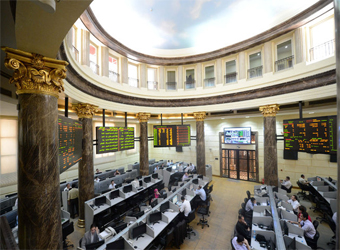Egypt’s bourse has opened Wednesday’s sessions incurring losses of EGP 2.3 billion for the fourth day through this week driven by the political instability woes.
The Egyptian Exchange’s indices were in dark red notes on early Wednesday.
Benchmark EGX30 sagged by 1.10% to 5165.05 p. EGX20 also dropped by 0.85% to 5818.71 p.
On the other hand, the mid- and small-cap index, the EGX70 inched down by 0.91% to 420.26 p. Price index EGX100 tumbled by 1.01% to 714.12 p.
The capital market has amounted to EGP 348.856 billion, according to data compiled by Amwal Al Ghad English at 11:28 a.m. Cairo time (09:28 GMT) during the opening session of Wednesday.
Trading Volumes & Values:
The trading volume has recorded 15.838 million securities worth EGP 76.538 million, exchanged through 2488 transactions during Tuesday’s midday.
Also during the opening session, 110 listed securities have been traded in; 62 declined, 7 advanced; while 41 steadied.
Investors’ Activities:
The non-Arab foreigners’ selling pressures have driven EGX’s opening losses as they were net sellers seizing 55.53% of the total markets, with a net equity of EGP 21.654 million excluding the deals.
Meanwhile, Egyptians and Arabs were net buyers seizing 38.35% and 6.13% respectively, of the total markets, with a net equity of EGP 18.539 million and EGP 3.115 million, excluding the deals.
Foreign NGOs Must Close In Egypt, Court Rules
A court in Cairo has convicted 43 Egyptian and foreign employees of non-governmental (NGO) organizations for working illegally in Egypt.
The court sentenced the defendants – most of them in absentia – to jail terms of up to five years.
It also ordered the closure of offices and the seizure of assets in Egypt belonging to several US NGOs.
The case – which began in 2012 – has strained relations between Cairo and Washington.
US officials had threatened to cut off the roughly $1.5bn (£980m) in aid paid to Egypt every year.
On-Air Ethiopia Dam Talk Scandal
The talks, chaired by Morsi, revolved around a report of a tripartite Egypt-Sudan-Ethiopia commission on Ethiopia’s decision to divert the Blue Nile for a massive dam project, sparking fears of a major impact on downstream states Egypt and Sudan.
Seated around a large table, the politicians thinking this was a closed meeting began to suggest ideas for ways to stop the dam project.
Ayman Nour, head of the liberal Ghad Party, suggested spreading rumors that Egypt was buying military planes in order to put “pressure” on Ethiopia, he said.
He also suggested Cairo send political, intelligence and military teams to Addis Ababa because “we need to intervene in their domestic affairs.”
Yunis Makhyun, who heads the conservative Islamist Nur Party, said the dam constituted a “strategic danger for Egypt”, requiring Cairo to support Ethiopian rebels “which would put pressure on the Ethiopian government.”
The meeting, a huge embarrassment both for the presidency and the opposition members who attended, caused a storm of ridicule and anger in the media.
“A scandal in front of the world,” read the headline of the independent daily Al-Tahrir.
Popular talk show host Reem Magued, who aired parts of the meeting on her show, said: “It’s true that we asked for transparency from the government but not like this, not to the point of scandal.”
Ethiopia has begun diverting the Blue Nile 500 metres (yards) from its natural course to construct a $4.2 billion (3.2 billion euro) hydroelectric project known as Grand Renaissance Dam.
The first phase of construction is expected to be complete in three years, with a capacity of 700 megawatts. Once complete the dam will have a capacity of 6,000 megawatts.
